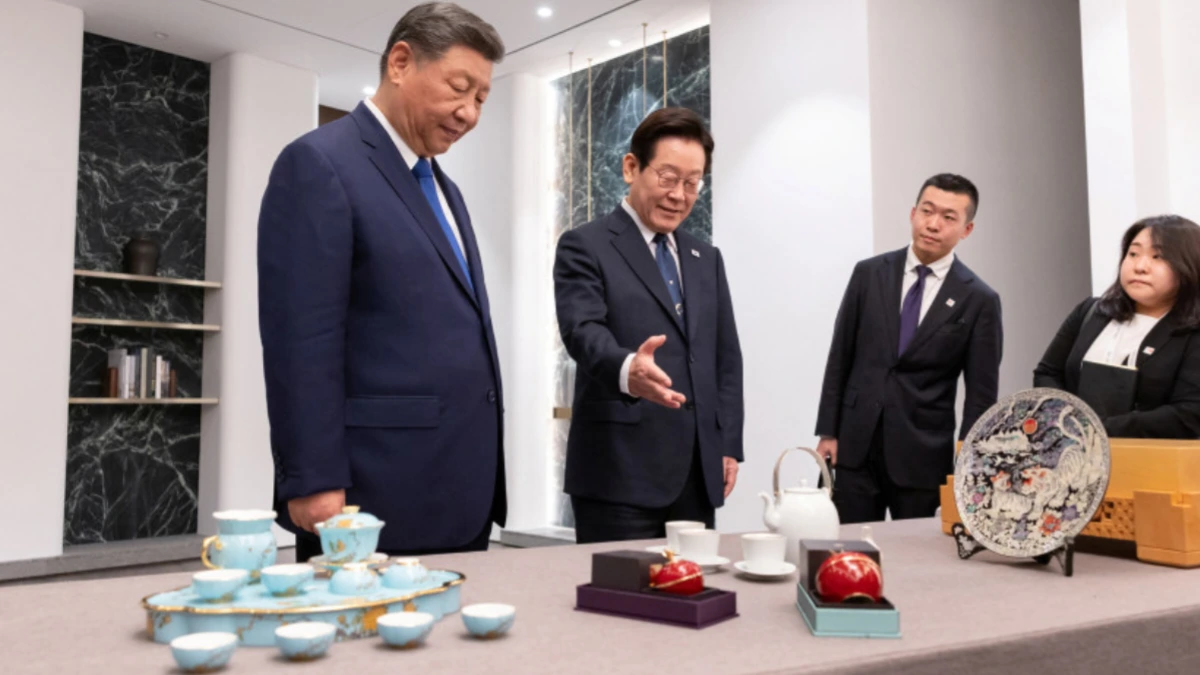Chinese President Xi Jinping sparked laughter during a state visit to South Korea after joking about a potential “backdoor” in Xiaomi smartphones he gifted to South Korean President Lee Jae Myung.
The remark, made during a bilateral meeting following the Asia Pacific Economic Cooperation forum in Gyeongju on Saturday, underscored the ongoing geopolitical undercurrents surrounding technology, data security, and regional competition.
The exchange occurred as Xi handed Lee a pair of Chinese made Xiaomi phones, to which Lee responded by asking about “communication security.” Xi replied with a grin, “You can check if there’s a backdoor,” prompting laughter from both delegations.
Xi’s visit marked his first trip to South Korea in eleven years, signaling a thaw in relations between Beijing and Seoul after years of diplomatic strain over US China rivalry and security concerns tied to the deployment of the THAAD missile defense system in 2017.
The gift choice was notable Xiaomi smartphones presented in the home country of Samsung Electronics, a global tech powerhouse and one of Xiaomi’s fiercest competitors. Analysts noted that the gesture carried symbolic weight, reflecting both technological confidence and subtle rivalry.
“The choice of Xiaomi over a more traditional or cultural gift signals China’s emphasis on showcasing its domestic innovation,” said Min Kyung ho, a professor of international relations at Korea University. “But the backdoor comment also reflects the underlying global debate about trust in technology.”
A “backdoor” refers to hidden software or hardware methods allowing unauthorized access to devices or systems a frequent concern in the era of global digital surveillance and cybersecurity tensions.
Xi’s remark appeared to carry a dual meaning humor on the surface, but also a pointed reminder of the mutual distrust embedded in the global tech landscape.
China has repeatedly criticized US restrictions on semiconductor exports, including proposals that chips sold abroad be equipped with tracking functions.
“Xi’s joke may have been lighthearted, but it comes at a time when both nations are grappling with profound questions about digital sovereignty,” said Dr. Eunseo Park, a cybersecurity researcher at the Seoul Institute of Technology.
“South Korea has to balance its economic reliance on Chinese manufacturing with its security alliance with the United States.” China’s foreign ministry and Xiaomi did not immediately comment on the exchange.
Lee’s office said it had “no separate statement” regarding the incident, framing the meeting as part of a broader dialogue on economic cooperation and regional stability.
Xiaomi, listed in Hong Kong under ticker 1810.HK, remains one of China’s most prominent consumer technology firms, ranking among the world’s top five smartphone makers.
According to Counterpoint Research, Xiaomi held roughly 12 percent of global smartphone shipments in 2024, while Samsung led with 20 percent.
South Korea’s own technology sector remains heavily integrated with global supply chains, including Chinese components.
Trade data from the Bank of Korea show that China remains South Korea’s largest trading partner, accounting for about 23 percent of exports in 2024.
However, mutual dependencies have also bred vulnerabilities. Seoul’s participation in U.S.-led chip alliances including restrictions on technology transfers to China has occasionally drawn Beijing’s ire.
Reactions in South Korea ranged from amusement to cautious reflection. “It was funny, but also ironic,” said 29 year old IT worker Kim Joon seok in Seoul.
Everyone here knows about cybersecurity risks, whether from China, the US or anywhere else. Xi’s joke just reminded us how political our phones have become.
Others viewed the gesture as an olive branch wrapped in subtle competition. “A Xiaomi phone in the land of Samsung that’s diplomacy with a tech twist,” said Park Ji hye, a political analyst and former trade official.
It’s a sign that Beijing wants to reset relations through economic and cultural symbols, not confrontation. In China, social media users on Weibo largely praised Xi’s humor.
Our president has confidence even when gifting our technology abroad, one user wrote, while another added, It shows China no longer fears comparisons with foreign brands.
The exchange between Xi and Lee comes as the Asia Pacific region grapples with technological decoupling and trade realignments.
Both countries have sought to navigate between US and Chinese economic spheres while maintaining their respective strategic interests.
Symbolic moments like this can influence the tone of future cooperation, said Han Seung won, a former South Korean diplomat.
“Even a lighthearted remark about a ‘backdoor’ can remind both sides of the fine line between competition and collaboration.”
Observers expect future meetings to focus on semiconductor supply chains, renewable energy investment, and restoring tourism and cultural exchanges disrupted during the pandemic years.
Xi’s “backdoor” quip offered a rare moment of levity in an otherwise serious diplomatic encounter, highlighting how humor and symbolism intertwine in geopolitics.
While the comment drew laughs, it also underscored deeper questions about trust, security, and influence in the digital age.
As China and South Korea navigate their complex relationship balancing economic cooperation with national security even a smartphone gift can carry layers of meaning far beyond its packaging.
